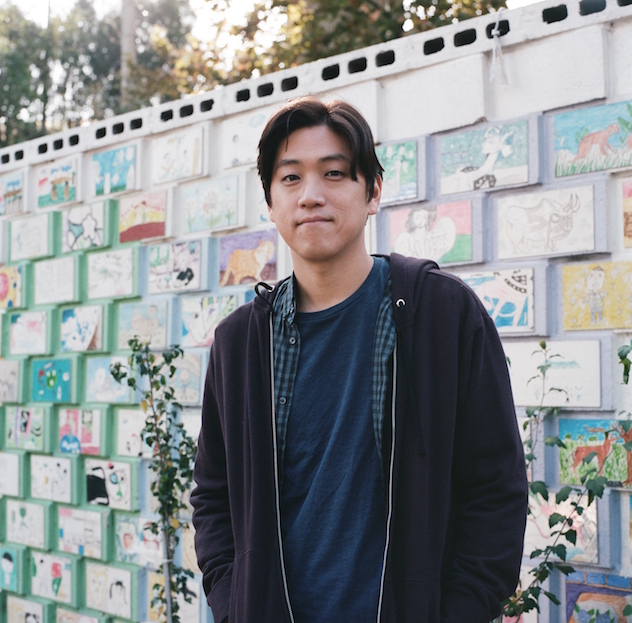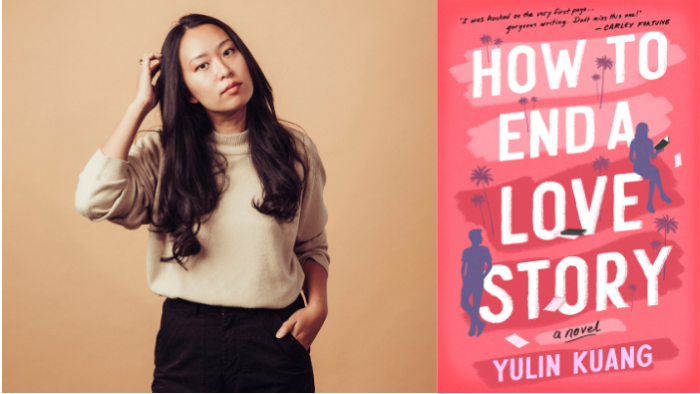Bobby Choy’s “Fiction and Other Realities” begins with a song.
The film — a melody of the artist’s truth, replete with music and lyrics, screenwriting and co-directing chops — opens in New York City, and takes flight in Seoul: We first meet Bobby, our lead character (played by Choy), as he plays the guitar and croons away while settled comfortably in a bathtub.
When Bobby gets the opportunity to travel with his friend’s band, he quits his dead-end telemarketing job and joins the gang as a roadie. (Comedian Danny Cho steals the scene in a brief appearance as Bobby’s boss.) Once he gets to Seoul, he meets a fellow singer-songwriter, Ina, who busks in the streets, and they begin performing together. There are, of course, a few situational faux pas he commits along the way as a Korean American in South Korea.
“Fiction” plays in such a way that it’s the filmmaker telling you the story himself, straight from the heart — so much so that one wonders what one could have possibly done to deserve his trust.
This feature directorial debut from Choy is loosely based on the filmmaker’s life as an Asian American moving from New York City to Seoul, the country of his parents’ upbringing.
While not a complete newcomer to the filmmaking world, Choy — who also composed the film’s score — is a fresh voice joining what is shaping up to be a blooming year for Asian American filmmakers.
The newly minted auteur is known for his work as a musician. As Big Phony, Choy has an impressive list of credits, including multiple performances at SXSW and an enviable track record of featured music on various film and television soundtracks.

Please introduce yourself.
My name is Bobby Choy. I’m a sad indie singer-songwriter with a stage name “Big Phony.” I was born and raised in New York City but have been based in Seoul for the past seven years, roughly. I wrote my first song 26 years ago and haven’t stopped since. I fail at life every day, but I’m surrounded by very forgiving souls.
What was it like going from musician to filmmaker?
I feel more comfortable calling myself a first-time filmmaker, if at all. When I wrote the first draft of the “Fiction” script, I actually picked the music first and created a narrative around some of my existing songs. About 30 of my songs make up the soundtrack. I’ll let those that see the film decide if I deserve the title of filmmaker.
Some people may know you from “Ktown Cowboys” (back when it was a web series) or the documentary “I Hate Big Phony.”
We actually made a feature film also called “Ktown Cowboys” which premiered at SXSW a few years back. That was actually an important experience that gave me a certain amount of courage to attempt my own personal project. There’s a lot of knowledge and know-how I was able to pick up from being involved in those projects
You not only wrote the script and scored and co-directed the film, but play the lead character. Did you have any reservations about putting yourself on camera?
I have a tremendous respect for actors and their craft and I was most definitely self conscious about stepping anywhere close to their arena. I think it’s important to respect artists that have spent years developing their talents. I don’t take it lightly and made sure I let the actors shine as much as possible and kept my lines to a minimum on the page and stage. The actors in our film also carried me in every scene. They were all incredibly gracious with their time and were not only prepared for their performances, they also helped me get to a place where I could feel comfortable acting opposite them.
Are you interested in more acting in the future?
I’m not gonna lie, it was a lot of fun acting in “Ktown Cowboys” and “Fiction.” I must say though, that I would only consider acting again in the future if it made sense to a specific project where perhaps a director needed an actual musician or someone similar to who they believe I could possibly embody. Otherwise, I think I should probably leave the acting up to serious career actors, respectfully.
The lead female character Ina, played by Hwa-young Lim, is so interesting and talented – she sings, plays guitar, and goes busking in the streets. Some people may recognize her from her work in Korean dramas. Her character was so distinct from where she’s been seen before. Did you know her previous work before working with her?
We really lucked out getting [Lim] to play the female lead in our film. Honestly, I hadn’t seen her work before but she blew us away in her audition and her talent was undeniable from the get-go. She really did us a solid coming onboard our indie-budgeted film. I’m gonna say she definitely took a pay cut to join us. This was her first lead role in a feature film, which I still find hard to believe. I’ll forever be grateful to her commitment to our film as an artist, and now as a friend. She’s going places she hasn’t already been… mark my words.
Seoul is so often depicted in such extremes: either the pristine, starkly modern cosmopolis of K-dramas on one end of the spectrum, or the gritty, concrete illustrations of feature films. The setting of “Fiction” gives viewers a glimpse into the world of artists, and the streets of the Hongdae neighborhood. Did you have a specific goal of how you wanted show such a special setting on screen?
We’re an indie production. We wanted to be as honest as possible about how we could depict this little pocket of Seoul given our limited budget and resources. I think indie films have no other choice but to be less flashy and inherently bare bones but it also forces you to be certain that your subject is interesting without any of the purposed bling or grit. The story is about an indie singer-songwriter, so thankfully the budget matches the subject.
What was it like shooting in Korea? In Hongdae?
Hongdae is a lively area of Seoul. Opens early and stays open late. We got a lot of support not only from the Seoul Film Commission with location grants but many of the Hongdae businesses welcomed us to film on their premises, often even at no cost. Our producer Sejin Park [Dramaworld] was the one that made all of that possible. I live in Hongdae so it was fun getting to film at places I frequent.
Could you talk a little bit about some of the other cast members? You had some non-actors involved.
A lot of musicians were involved in the making of this film like Yuk Joong-wan, MYK, Kim Ezzy, Brad Moore from Busker Busker, and all the members of the Korean punk rock band No Brain. The character “Dolly” was played by No Brain’s drummer Hyun Sung-hwang. He’s actually also a co-producer on this project. Sandy Lee, who played my mother in the film, is actually the real-life mother of James Lee of Royal Pirates. It was actually a lifelong dream of hers to act so it was awesome that we were able to help make that dream come true for her. She did so great! Besides Hwa-young Lim, the other professional actor in our film was Todd Goble, who plays Bobby’s best friend Billy. The stars really aligned for us having Todd join us. He is not only an amazing talent and amazing human being, we’ve also become great friends.
What were the biggest challenges in making this film?
Editing this film was truly a challenge because it’s a film that’s about 70 percent in Korean and 30 percent in English. Editing for a Korean audience and for a non-Korean audience is trickier than one might think. One example: Most Koreans have never heard of Dolly Parton, and one of our characters is named after her. One of our scripted and filmed scenes was proven irrelevant in the edit. Budget is always a challenge. This is an indie film but that doesn’t mean we did this for free. It was and still is an uphill battle financially.
Is it easier to write a song or a script?
It’s easy to do anything if you don’t care about quality. I’ll just say it’s incredibly difficult to write a song and it’s incredibly difficult to write a script. Do your homework if you’re going to attempt either. It shows when you half-ass something. I suppose that’s why the saying exists, “Write what you know.”
Is there anything else you’d like to say about the film, or anything at all?
Next indie artist you meet, please give them a hug. They probably need one.






